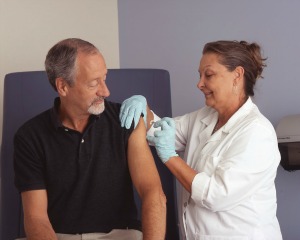Ever thought men should be able to shoulder the responsibility of birth control for a change?
Well now that's a real possibility, but it still may be a long way off before it ever hits the market.
An injectable birth control, similar to the depot shot, was tested in a new study sponsored in part by the United Nations and the results were published in the Journal of Clinical Endocrinology and Metabolism. The birth control was over 96 percent effective in preventing pregnancy, but the study, conducted from 2008 - 2012, was cut short because some participants couldn't handle the side effects. Some of the participants complained side effects, such as experiencing mild to moderate depression, increased libido, pain at the injection site and acne. In some extreme cases, it took longer for the participants to return to normal fertility levels and one person's sperm count still hasn't returned to its original levels, but it's unclear whether he's infertile or not.
The study stopped accepting new participants into the study in 2011 due to these side effects, but many have expressed that these side effects are very similar to what women using birth control face.
In fact, some cases result in side effects like blood clots, making birth control potentially life threatening, yet women have had to deal with such risks for decades.
Of the 320 participants, there were just four pregnancies. The study included 266 men between the ages of 18-45 years and their female partners. The women weren't using any birth control, and the couples relied on the male's birth control to prevent pregnancies.
The men received hormone injections every eight weeks, for up to 56 weeks.
Even though some experienced side effects, the general reaction to the birth control method was positive. More than 75 percent of participants said they were satisfied with the method and would be willing to use it if it was available.
The study was conducted on an international scale, with participants in Australia, Germany, United Kingdom, Chile, India, Indonesia, and Italy.
This was the first large scale, multi-country trial to look at a combination of testosterone and progestogen in male birth control.

